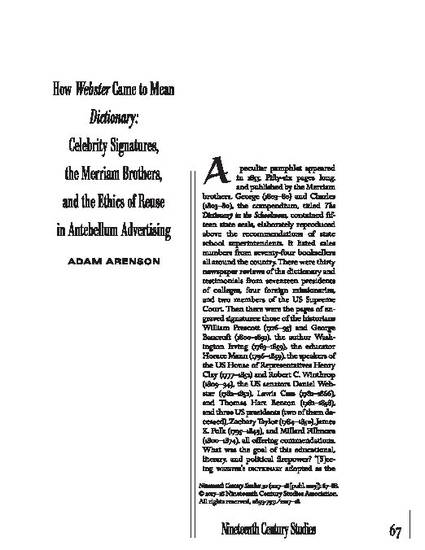
Article
How Webster Came to Mean Dictionary: Celebrity Signatures, the Merriam Brothers, and the Ethics of Reuse in Antebellum Advertising
Nineteenth-Century Studies
(2019)
Abstract
In 1828, Noah Webster finished An American Dictionary of the English Language, filled with erudite (if often erroneous) etymologies and Webster’s radical spelling innovations. It was a literary landmark but a commercial failure. In 1853, ten years after Webster’s death, publishers George and Charles Merriam achieved phenomenal success selling the dictionary as a national standard. Dozens of national figures, from George Bancroft and William Prescott to Washington Irving and Ralph Waldo Emerson to senators Daniel Webster, Henry Clay, Thomas Hart Benton, and Lewis Cass and former Presidents Polk, Taylor and Fillmore—were quoted praising the dictionary. The Merriams made Webster mean dictionary through their groundbreaking advertising campaign—using famous names to sell the dictionary as a national symbol, not as an educational work.
This article considers the innovations of the Merriams as a watershed moment in advertising, taking a technique used for patent medicines and applying it to the very nature of American language and character. Drawing on the archives of the G. and C. Merriam and Company of Springfield, this article documents how the Merriam Company sent out petitions and gift copies in the 1840s and 1850s as a means of receiving the standard courtesy of a thank-you letter—and then their reuse of the signatures as unwitting endorsements, clipped and arranged for engraving. The controversy that followed—especially from those like Washington Irving, who remembered Webster and did not wish to be seen as endorsing his beliefs—reveals the unsettled culture of advertising, especially testimonial advertising, that existed in the United States before the Civil War.
Keywords
- Merriam,
- Webster,
- advertising,
- reuse,
- war of the dictionaries,
- stereotype,
- celebrity,
- signature
Disciplines
Publication Date
2019
Publisher Statement
For this issue, there's no embargo. There's nothing preventing you from posting a PDF from this volume.
Citation Information
Adam Arenson, “How Webster Came to Mean Dictionary: Celebrity Signatures, the Merriam Brothers, and the Ethics of Reuse in Antebellum Advertising,” Nineteenth-Century Studies Volume 30 (2017-8 [published 2019]): 67-88.
